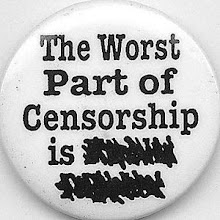"I'd like to tell you that I'm doing some research right now, but the fact is, I'm always doing research. Because I'm a researcher. Some of you might know what that means--it's like being a librarian, only you have to get the actual answer. [Insert laugh here] Once I tried telling my boss, "Look over in aisle five," and he told me to research the term "unemployment." [laugh again, if you've got a spare]
"I was a researcher before I went to library school. Library school taught me a million new sources of information--priceless stuff for research. It also taught me how weak researchers could be in the area of data collection and, most importantly, in discriminating among many sources.
"I didn't know researchers often leaned heavily on bad sources or just did lousy work until I saw what a good librarian could provide--and that every researcher should be a good librarian. On the other hand, I didn't know what a weak librarian was until I had a few reference courses and saw that, like any other trade, half the practitioners were below average.
"My problem is that I am living in a statistical anomaly: somehow I get all the bad ones. My requests for library assistance are very often deflating. I think the reason for this is that I want very badly for colleagues to be sharp--to make me proud of them and our work. Too often this just aint the case, friends. Let me tell you how it's boiling down in River City.
"I'm working on a project which requires me to make contact with librarians in all fifty states plus some other localities; like most of my work it involves laws that are similar everywhere but which differ in their particulars. I have to formulate strategies for dealing with the differences. Think of something like benefits for the homeless or unemployment insurance--a thing of many variables with some significant similarities. The librarians are in state agencies. As usual, I am using them as they are supposed to be employed: as initial sources and links to needed documents, statutes, statistics--all that sort of thing.
"My requests take the form of emails (when possible), and letters. I have not yet reached the phone call stage. Let's make up a question similar to what I'm asking:
"Dear Librarian, I am doing research on the application of federal blowtorch standards through the blowtorch licensing agency of your state. Of course, the federal government and your state have similar standards, and in fact your state enforces federal rules. I am seeking statistics on the following:
1. Blowtorch injuries for the past five years, as required by California statute.
2. Number of investigations for these injuries, and also for preventive inspections by the appropriate agency.
3. Final penalty assessments for injuries and failed inspections.
"Please note that I have not been able to discover any other source for this information; I was told by the enforcement agency that the State Library was the sole repository of the information and records I require. Please consider this a request under your state's version of FOIA, and inform me if other steps need to be taken to receive the information described. Many thanks, et cetera."
"Okay, now you've read the prelims. In our next posting we will show you how to get gray hair in a real quick hurry."
